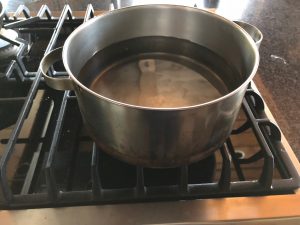The forecast was for high wind resulting in no power overnight, so we filled a kettle with water and ground coffee beans before we went to bed.
I slept through the wind, but when I woke before dawn the absolute dark told me the power was out.
The galaxy of LEDs that illuminates the house at night were all dark: The bathroom wasn’t glowing green from the electric toothbrush’s power indicator; both alarm clocks had gone blank; without the constellations of the clocks on the microwave, the wall oven and the range, the kitchen was a dark cave.
I hadn’t been in such concentrated dark since backpacking during a new moon back in September. I’d forgotten how restful complete darkness can be, and how difficult to find my way without these navigational aids.
So I stayed in bed enjoying this respite from electronic readouts shining at me all over the house. The house itself was silent: no heat recovery exchanger humming, no hot water heater kicking on, no pump. It was as if the house itself had stopped breathing. All I could hear was the roar of the wind, and underneath that, I could hear a neighbor’s emergency generator chugging along.
We don’t have one of those, and so far, we’ve been able to manage without power when it fails, which is usually for less than a day.
We have to make some accommodations: We flush only when necessary and conserve whatever water we have on hand. When a weather forecast includes heavy snow and/or high winds, we fill pots and buckets. We grind coffee beans for the morning. We refresh the batteries in flashlights tucked strategically all over the house. We bring in dry fire wood for the wood stove, and place a box of matches near the gas range, because the automatic ignition won’t work without power.
We’re prepared even when a power outage is the result of a random event, like a drunk crashing into a telephone pole, or a tree toppling over on its own accord, taking down the power line with it. Even if we haven’t filled a reservoir of water, we always have access to it. Right now, there’s still lots of snow out the back door we could melt on the wood stove; in summer, it’s a short walk to the river at the edge of our land, and we have neighbors whose power comes from a different service, so we’re rarely both out at the same time. One Christmas Eve, they brought their dinner over to roast in our oven. Yesterday, we collected drinking water from them.
So while it’s inconvenient to be without power and isolating to be without the landline or internet, we’re resourceful. We know that being without power for a few hours is a first-world problem. In many parts of the world, unreliable power generation is a fact of life.
When the power goes out, I become aware of how dependent I am on electricity. Automatically, I flip the light switch as I enter the bathroom; it’s a habit. The same as I descend to the basement to bring up a new jar of jam. I listen for the click-click-click of the electronic ignition as I try to light the stove, and when it doesn’t come, I remember – and reach for the matches.
The things that do work are basic: We have shelter and heat. The eggs from our flock and the bread in the larder – toasted on the wood stove and slathered with jam from our berries nourish us. We’re warm in our fleece wardrobe, more functional than fashionable, and we have a roof over our heads. So I’m not complaining about being without power for a day.
As we dined by candlelight, Tim said, “It’s still better than camping. We have food. We have shelter. We have each other.”
It’s a good reminder of how much we have, living “simply” in place.
➡Please help me back off Facebook by subscribing to receive these posts by email.
Just fill in your email address in the “Blog Sign Up” on the top right of the page.
Then check your email to confirm that you’re a reader and not a robot.
You’ll receive a weekly post by email, and I’ll know who I’m writing for. Thanks.



Friday -April 6, 2018- Noon
The fierce winds have passed and the hum of our whole house generator finally ceased one hour ago. The reading of “High Wind, No Power” brought me right back to the SECONDS between darkness, silence and the clickity-clack indicating the generator was going to do its job. I was grateful for that generator, particularly after learning we might be out of power until Sunday due to a tree that had fallen on a wire bordering our property. How would I have ever cooked Greek Easter dinner this coming Sunday, April 8th ?
The winter of 2008 was the first in our home on Timson Hill and we lost power for several days. Immediately, the old camping mentality kicked in as we navigated through the darkness, gathered the match sticks, candles, extra sweaters, hats, flashlights and used the fireplace for warmth and cooking. It was fun for us, but my 86 year-old mom was in frozen mode on day one despite her being wrapped in blankets. Off she I went to a friends on Dover Rd. while Bill shoveled the snow, kept the fire stoked in the fireplace and kept the pipes from freezing. Soon after, we purchased the generator ’cause Mom was here to stay.
Great story! Happy Orthodox Easter.
It’s very rare to be without power where we live, but back in the seventies, when strikes meant that we were on three- day weeks, power outages were a regular feature. My clearest memory is of going to ballet classes lit by candles on saucers round the edge of the rehearsal room: We needed to concentrate not only on our dance steps but on avoiding burning ourselves! Health and safety wasn’t so high on the list back then!
What a lovely image: dancers at the barre by candlelight! It must have been lovely to dance in the semi-dark.
During Hurricane Sandy I loved the non-electric days and nights. (Don’t tell anyone). I too took refuge in a sheltered home (with running water) but the stillness and time by sun and moon were the most relaxing. No one could text, phone, email with problems to solve or jobs to do- I was solo and loving it. But my aquatics needed warm water to live so I was happy when the noise and light returned. I now own a house generator to make sure my fish and turtle stay warm. Thanks for bringing back the memory.
Thanks for saying the “unsayable.” I think it’s important for people to remember that they can live without electronic devices – that there’s even some value to rediscovering the natural rhythms of light and dark and quiet.
I totally agree! They are special moments.